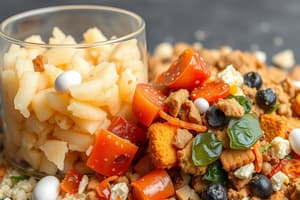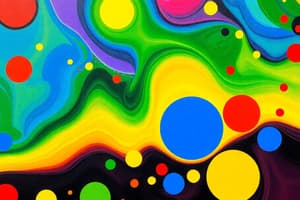Podcast
Questions and Answers
Which type of mixture has particles that are dispersed but do not settle over time?
Which type of mixture has particles that are dispersed but do not settle over time?
- Heterogeneous mixtures
- Homogeneous mixtures
- Colloids (correct)
- Suspensions
What method can be used to separate the components of a mixture?
What method can be used to separate the components of a mixture?
- Chemical reaction
- Molecular bonding
- Filtration (correct)
- Combustion
Which of the following is an example of a heterogeneous mixture?
Which of the following is an example of a heterogeneous mixture?
- Air
- Vinegar
- Salad (correct)
- Saltwater
What defines a homogeneous mixture?
What defines a homogeneous mixture?
Which of the following describes an emulsion?
Which of the following describes an emulsion?
What is a common characteristic of suspensions?
What is a common characteristic of suspensions?
What type of mixture is smoke classified as?
What type of mixture is smoke classified as?
Which characteristic is true regarding the components of a mixture?
Which characteristic is true regarding the components of a mixture?
Which of the following is a characteristic of homogeneous mixtures?
Which of the following is a characteristic of homogeneous mixtures?
What is an example of a homogeneous mixture?
What is an example of a homogeneous mixture?
How do homogeneous mixtures typically form?
How do homogeneous mixtures typically form?
What can be said about the composition of homogeneous mixtures?
What can be said about the composition of homogeneous mixtures?
Which of the following can be classified as a gas that is a homogeneous mixture?
Which of the following can be classified as a gas that is a homogeneous mixture?
What is a common application of homogeneous mixtures?
What is a common application of homogeneous mixtures?
Flashcards are hidden until you start studying
Study Notes
Mixture Characteristics
- Definition: A mixture consists of two or more substances that are physically combined but not chemically bonded.
- Homogeneity:
- Homogeneous mixtures (solutions) have a uniform composition (e.g., saltwater).
- Heterogeneous mixtures have a non-uniform composition (e.g., salad).
- Phase: Mixtures can contain different phases (solid, liquid, gas).
- Components: Each component in a mixture retains its individual chemical properties.
- Separation: Mixtures can be separated into their components through physical methods (e.g., filtration, distillation).
- Proportions: The components can vary in proportion, affecting the mixture's properties.
Types of Mixtures
-
Homogeneous Mixtures (Solutions):
- Consistently mixed at a molecular level.
- Examples:
- Saltwater
- Air
- Vinegar
-
Heterogeneous Mixtures:
- Non-uniform composition.
- Examples:
- Salad
- Granite
- Oil and water
-
Colloids:
- Intermediate between homogeneous and heterogeneous.
- Particles are dispersed but not settled.
- Examples:
- Milk
- Fog
- Ink
-
Suspensions:
- Heterogeneous mixtures with larger particles that can settle over time.
- Requires shaking or stirring to mix.
- Examples:
- Muddy water
- Sand in water
-
Emulsions:
- Mixtures of two immiscible liquids, typically stabilized by emulsifiers.
- Examples:
- Mayonnaise (oil and vinegar)
- Lotion (oil and water)
-
Aerosols:
- Mixtures of solid or liquid particles dispersed in a gas.
- Examples:
- Smoke
- Mist
Summary
- Mixtures can be classified based on uniformity and component behavior.
- Understanding the characteristics and types of mixtures is essential for applications in chemistry, cooking, and pharmaceuticals.
Mixture Characteristics
- Mixtures are formed by physically combining two or more substances without chemical bonding.
- Homogeneous mixtures exhibit a uniform composition, known as solutions; examples include saltwater and air.
- Heterogeneous mixtures have non-uniform composition, such as salad and granite.
- Mixtures can encompass various phases: solid, liquid, and gas.
- Each component in a mixture maintains its unique chemical properties.
- Physical methods, including filtration and distillation, can effectively separate mixtures into their individual components.
- The proportions of components in a mixture can change, influencing the overall properties of the mixture.
Types of Mixtures
- Homogeneous Mixtures (Solutions): Uniformly mixed at the molecular level; includes examples like saltwater, air, and vinegar.
- Heterogeneous Mixtures: Characterized by non-uniform composition; notable examples are salad, granite, and oil combined with water.
- Colloids: Serve as a bridge between homogeneous and heterogeneous mixtures, characterized by particles that are dispersed but do not settle; common examples are milk, fog, and ink.
- Suspensions: Heterogeneous mixtures with larger particles that can settle over time, requiring agitation to mix; muddy water and sand in water are typical examples.
- Emulsions: Formed by mixing two immiscible liquids, often stabilized by emulsifiers; mayonnaise (oil and vinegar) and lotion (oil and water) are examples.
- Aerosols: Comprise solid or liquid particles dispersed in a gas; examples include smoke and mist.
Summary
- Classifying mixtures based on uniformity and component characteristics is crucial.
- Understanding mixture types and their properties has practical applications in fields such as chemistry, cooking, and pharmaceuticals.
Definition
- Homogeneous mixtures feature a uniform composition, ensuring consistency throughout the mixture.
Characteristics
- Composition remains identical throughout, making individual components indistinguishable.
- Typically exists in a single phase—solid, liquid, or gas.
- Often presents as one cohesive substance, without visible separation of components.
Examples
-
Solutions:
- Saltwater is a classic example, where salt is fully dissolved in water.
- Sugar dissolved in water showcases a sweet solution with uniform sweetness.
- Vinegar, which consists of acetic acid in water, maintains a consistent acidity level.
-
Gases:
- Air exemplifies a homogeneous mixture, combining various gases without distinct layers.
-
Alloys:
- Steel, primarily composed of iron and carbon, is utilized in construction for its strength.
- Brass, formed from copper and zinc, is commonly used in musical instruments and fittings.
Formation
- Homogeneous mixtures form through processes including dissolving substances, such as mixing salt in water.
- The melting or combining of different materials, like metals in alloys, also contributes to their creation.
Properties
- The uniform composition leads to predictable physical and chemical properties of the mixture.
- Separation methods like filtration are ineffective as components blend at the molecular level and cannot be easily isolated.
Comparison with Heterogeneous Mixtures
- Heterogeneous mixtures differ in composition, allowing individual components to be identified and visually separated.
- Examples of heterogeneous mixtures include salad, soil, and mixtures of sand with pebbles.
Applications
- Important in fields such as chemistry for reactions and solutions preparation.
- Significant in cooking, impacting flavor and texture of foods.
- Vital in materials science, particularly in the industrial production of alloys and various solutions.
Studying That Suits You
Use AI to generate personalized quizzes and flashcards to suit your learning preferences.




